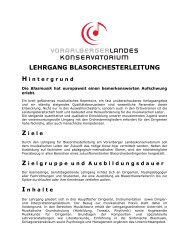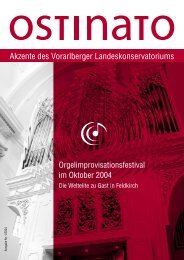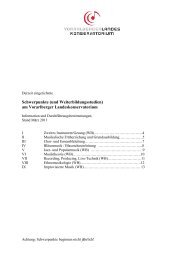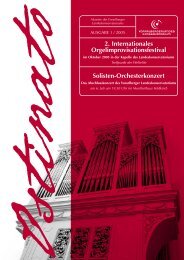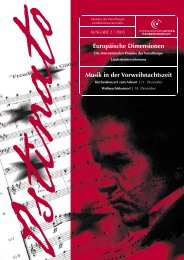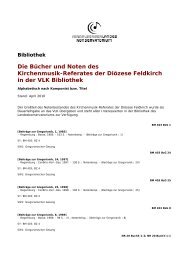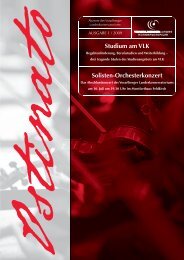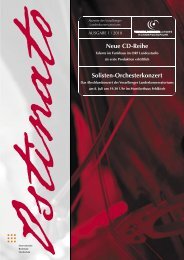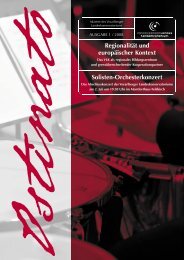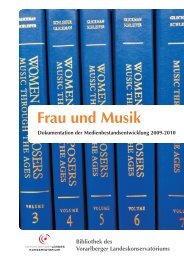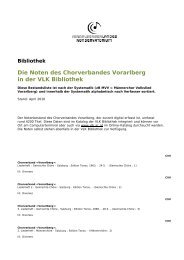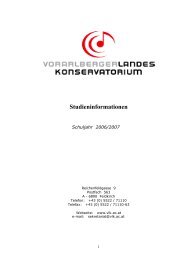Landeskonservatorium Vorarlberg
Landeskonservatorium Vorarlberg
Landeskonservatorium Vorarlberg
You also want an ePaper? Increase the reach of your titles
YUMPU automatically turns print PDFs into web optimized ePapers that Google loves.
ist reopening in 1946 until 1979. Ever since, the building has been known as the <strong>Vorarlberg</strong>er<br />
<strong>Landeskonservatorium</strong> and is open to some 400 students studying music.<br />
The capital of <strong>Vorarlberg</strong>, Bregenz, on the eastside of the Lake of Constance, possesses a unique<br />
medieval town center above the busy streets of modern Bregenz, as well as the largest openair<br />
stage on the lake with a charming promenade. Worth seeing: Pfänder cable car, Alpine game park<br />
Pfänder and eagle show, Festival house, “Kunsthaus” Art gallery. World famous cities and cultural<br />
centres are also within easy reach of <strong>Vorarlberg</strong>: For example, Zurich (125 km), Innsbruck (155<br />
km), Munich (220 km) or Milan (260 km).<br />
FullTime Degrees<br />
Bachelor of Arts: Instrumental and Voice Pedagogy<br />
As of 2005, the <strong>Vorarlberg</strong>er <strong>Landeskonservatorium</strong> offer a Bachelor of Arts in Music Education<br />
(vocal or instrumental) in collaboration with the Music University Mozarteum in Salzburg. This<br />
undergraduate study provides a wellrounded artistic, pedagogic and scientific education in keeping<br />
with international standards of quality. This study furthers the acquisition and refinement of<br />
abilities, knowledge and experience, at the same time encourages critical observation, evaluation<br />
and documentation. The breadth of the training guarantees versatility for future professional<br />
practice, whether in music education, cultural management or media, freelancing, etc. The<br />
foundation for lifelong learning is firmly established. The Bachelors Degree is recognised<br />
worldwide and enables continuation of studies for a master degree at any university or college. It<br />
also facilitates application for work in other European countries; cumbersome recognition<br />
procedures are a thing of the past!<br />
The course of study in IGP normally takes four years. As part of the study, one must choose a minor<br />
an instrument or special area of study. Except for minors in contemporary music and composition<br />
techniques, an audition is required. The following minors are available: second instrument (voice),<br />
preschool music education, choral or ensemble conducting, pop and jazz music, contemporary<br />
<strong>Vorarlberg</strong>er <strong>Landeskonservatorium</strong> GmbH – International Office – www.vlk.ac.at<br />
3



